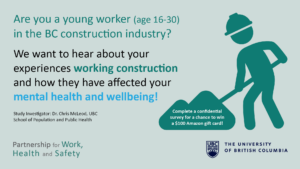
Meet Chizitara Nkwopara, a graduate student at UBC’s School of Population and Public Health, specializing in Occupational and Environmental Hygiene. With a Bachelor’s in Physiology and five years as a Health Safety and Environment Professional in Nigeria, her research focuses on the mental health and well-being of young and new construction workers. Her findings aim to enhance safety training and foster healthier work environments.
Chizitara is an award winner of two consecutive scholarships from the American Industrial Hygiene Association (AIHA). This year, she received the AIHA Minority Special Interest Group (MSIG) Scholarship, and last year, she was awarded the Liberty Mutual Scholarship from AIHA.
Read below to learn more about her background, current research, and public health aspirations.
Tell us about your background.
I have a Bachelor of Science in Physiology. Before coming to Canada, I worked as a Health Safety and Environment Professional for 5 years in the Oil and Gas and Construction industries. I began as a graduate trainee and progressed to a Safety Officer/Team Lead.
I currently work as a Research Assistant and Project Coordinator at the Partnership for Work, Health and Safety at UBC. I have facilitated research projects that focus on improving the health, safety and wellness of vulnerable workers, especially within the construction industry.
What motivated you to pursue a graduate degree in Occupational and Environmental Health?
I was drawn to the Occupational and Environmental Health profession because it is needed anywhere there is a workplace. I chose to advance my career in Occupational Hygiene (OH) because I am passionate about creating environments where workers can thrive without compromising their well-being. My background in health sciences, experience in health and safety and passion for helping others make OH the perfect fit for me.
Why did you decide to study at the School of Population and Public Health at UBC?
UBC is recognized as one of the world’s top 40 universities with North America’s most international campus community, so I knew that I would be adequately supported as an international student. Coming from Nigeria which is very warm, I knew that adjusting to the winter in Vancouver wouldn’t be so terrible since it is one of the warmest cities in Canada.
The Occupational and Environmental Hygiene (OEH) program at the School of Population and Public Health, UBC is the only OH master’s program in Canada that offers students the option to complete a thesis or a practicum-based project. Students in both streams receive the knowledge and skills needed to continue in industry work or further research.
What is your current research focus and why is it important?
My current research is focused on understanding how construction jobs and working conditions affect the mental health and well-being of young and new construction workers before any musculoskeletal injury diagnosis.
The British Columbia (BC) construction industry sees a significant number of musculoskeletal injuries, particularly among young workers, according to the 2017-2021 WorkSafeBC construction industry claims analysis. These injuries impact physical health and mental well-being, leading to time off work and potential long-term consequences. Poor mental and psychological health may lead to reduced productivity and focus of a (construction) worker. This poses a threat to their safety and the safety of their co-workers and increases the risk of developing an injury.
Findings from this project will inform the onboarding, orientation and training materials of the British Columbia Construction Safety Association (BCCSA) and WorkSafeBC. By participating in this study, young workers can contribute to developing education, training, and early interventions to improve their overall health and safety.
Are you a young worker (age 16-30) in the BC construction industry or you know someone who is? Participate in this confidential survey to share your experience working in the industry for a chance to win a $100 gift card.

What’s your advice for someone who wants to study OEH?
Be prepared to work hard, add value and build relationships. Also, be prepared to engage with a wide range of disciplines—OEH is an interdisciplinary field that requires knowledge in areas such as toxicology, epidemiology, public policy and research.
Finally, being flexible and open-minded with learning will serve you. You will be in great hands with a program where faculty and staff care about the students so do not be afraid to ask for help.
What are your plans for the future?
I plan to work as a Hygienist in Canada. I am very interested in workplace mental health and hope to continue to create awareness until it becomes a key focus area in the hygiene industry. I intend to remain current in hygiene and safety industry practices and aspire to become a Certified Industrial Hygienist.
Learn more about UBC’s MSc OEH Program